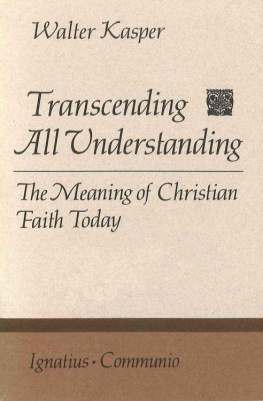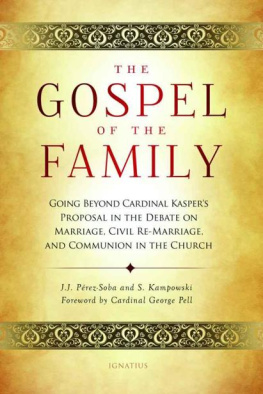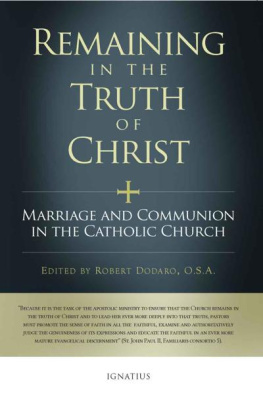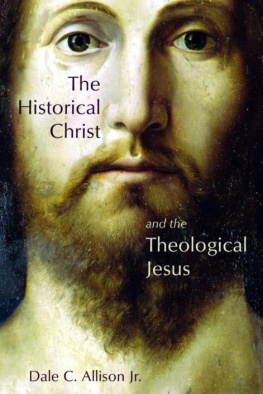The God of Jesus Christ
The God of Jesus Christ
New Edition
Walter Kasper

Published by T&T Clark International
A Continuum Imprint
The Tower Building, 11 York Road, London SE1 7NX
80 Maiden Lane, Suite 704, New York, NY 10038
www.continuumbooks.com
All rights reserved. No part of this publication may be reproduced or transmitted in any form or by any means, electronic or mechanical, including photocopying, recording or any information storage or retrieval system, without permission in writing from the publishers.
Walter Kasper, 2012
For the German original edition:
Verlag Herder GmbH, Freiburg im Breisgau, 2008
This translation is published with kind permission.
www.herder.de
Walter Kasper has asserted his right under the Copyright, Designs and Patents Act, 1988, to be identified as the Author of this work.
British Library Cataloguing-in-Publication Data
A catalogue record for this book is available from the British Library
ISBN: 978-1-441-11896-7
CONTENTS
PART ONE
The God-Question Today
PART TWO
The Message about the God of Jesus Christ
PART THREE
The Trinitarian Mystery of God
Introduction to the New Edition
New Aspects of the Doctrine of God
Today theology is reassessing its place among the sciences, in the world of culture and in the life of the Church. Twenty-five years ago my book The God of Jesus Christ offered my contribution to this positioning. In a deliberately polemical way The God of Jesus Christ argued for a theological theology. For in order to find its own independent place among the multiple range of meanings and to be heard among the babble of opinions, theology must first and foremost know itself what it is. It can only keep its relevance when it keeps its unchangeable identity as theology that is, speech about God and when theology and Church do not degenerate into mere ethical-moral institutions. So it is time to speak about God.
This Introduction to the new edition is an attempt to make possible a re-reading of The God of Jesus Christ (1982) in the light of the enormous changes in the way the question has been formulated over the last 25 years. Even a fairly complete review of the large literature that has appeared in the meanwhile is frankly not possible for me because of my many other commitments. It seems more important to mention the far-reaching intellectual, cultural, religious and political changes over the last two decades. Here too I can only single out some of the problems, about which the discussion and my own views have developed. I also think it is important also to highlight the existential and pastoral meaning of the doctrine of God in this new situation. We can only speak of God when we also speak with him.
1. Place and relevance of the doctrine of God
In a situation like ours, in which talk about God is both constantly challenged and topical again, theology must first of all determine its own position. For there are many ways of speaking about God and he has been spoken about in many ways throughout the history of religion. Over the course of history hardly any other word has been so misused, so besmirched and dragged through the mire, and no other word has
The focus on the God of Jesus Christ is not Christian particularism. For Jesus Christ is the image of the invisible God, through whom and for whom all things were created (Col. 1.15). He is the Light of the World (Jn 1.4f, 9; 8.12). In him shines the mystery of the world and humanity, as it was laid down from the beginning of creation (Mk 10.6). Through him humanitys dignity and highest calling is newly and finally revealed and the mystery of pain and death, which would otherwise oppress them so sorely, becomes clear (Gaudium et Spes 22). Jesus Christ, the image of God, reveals and gives us back our likeness to God (Gen. 1.27). In his light it becomes easier for us to recognize the many traces of God in creation. The christological starting point of The God of Jesus Christ reveals God to us again as the creator of heaven and earth and as the Father of all humankind (cf. Mt. 5.45).
By taking for granted this historical that is, christological approach to God, The God of Jesus Christ caries on from what was set out in more detail in Jesus the Christ: the core of Jesus ministry and preaching was God and the Kingdom of God (cf. Mk 1.14f). Jesus claimed he was speaking and acting in Gods place, God was the heart of his whole existence. Ultimately, Jesus can only be understood from his inner unique relationship to his Father. As Gods eternal Son, he revealed God to us as his Father and ours, as well as the Father of all humankind (cf. Mt. 5.45). So The God of Jesus Christ starts from Gods historical self-revelation to Abraham, Moses and the prophets, which, according to Christian belief, reached its final, unsurpassable historical climax in Jesus Christ.
More precisely, The God of Jesus Christ starts from the confession made by everyone who is baptized into the discipleship of Jesus and the community of the Church: I believe in God the Father almighty. This confession which unites Christians, otherwise divided and separated in many ways, is founded on the joint witness of the Old and New Testaments. As the first sentence of the Creed, it is the foundation upon which the whole confession of faith and being a Christian stands or falls. So Jesus first and greatest commandment is to love the one true God with our whole heart, whole soul and strength which, in accordance with Gods own nature, includes loving our neighbours as ourselves (cf. Mk 12.29f).
Therefore what true theology ought to stress is passion for God and his Kingdom. Thomas Aquinas could say that theology deals first with God, and then created reality in so far as it relates to God as its origin or goal (Summa Th. 1 q. 1 a. 3 ad 1; cf. a. 7). So the many genitive theologies (theology of nature, theology of society, liberation theology, theology of culture, of art, etc.) only have legitimacy and meaning in so far as they see their particular subject in the light of God, or as Thomas Aquinas would say, from the standpoint of theologys formal object. Theology wants to honour God in everything and above all.
Such theological passion is not at all remote from the world or from life. In the footsteps of the whole patristic tradition, Thomas Aquinas made clear the existential character of this theological approach. He showed that happiness ultimate human fulfilment does not lie in riches, power, prestige, pleasure, but in the knowledge of God (Summa Th. a. 4. c. a.; I/II q. 3 a. 1). Scripture says exactly the same: This is eternal life, that they may know you, the only true God, and Jesus Christ whom you have sent (Jn 17.3). God is the final and ultimate truth about humankind and the world. God alone is great enough to fulfill the longing of the human heart; God alone satisfies (Teresa of Avila). Thus in particular situations, passion for God may lead to prophetic denunciations of idols and ideologies for Gods sake. Therefore it is also a passion for humankind and human freedom. This is not blind fanaticism. It makes clear that what appears as an act of subjugation is really a tremendous act of liberation from all worldly absolute claims and entry into a personal loving relationship with God, whom we call our Father and acknowledge as the Father of all human beings. Serving God means to reign. (Deum servire regnare est.)
Hence confession of the one true God of Jesus Christ is not only a theoretical world view or ideological statement. What is being said is not only that God is, that he is one and almighty. Belief in God is not only about
Next page









